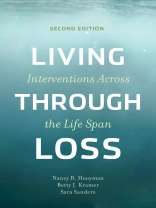Living Through Loss provides a foundational identification of the many ways in which people experience loss over the life course, from childhood to old age. It examines the interventions most effective at each phase of life, combining theory, sound clinical practice, and empirical research with insights emerging from powerful accounts of personal experience.
The authors emphasize that loss and grief are universal yet highly individualized. Loss comes in many forms and can include not only a loved one’s death but also divorce, adoption, living with chronic illness, caregiving, retirement and relocation, or being abused, assaulted, or otherwise traumatized. They approach the topic from the perspective of the resilience model, which acknowledges people’s capacity to find meaning in their losses and integrate grief into their lives. The book explores the varying roles of age, race, culture, sexual orientation, gender, and spirituality in responses to loss. Presenting a variety of models, approaches, and resources, Living Through Loss offers invaluable lessons that can be applied in any practice setting by a wide range of human service and health care professionals.
This second edition features new and expanded content on diversity and trauma, including discussions of gun violence, police brutality, suicide, and an added focus on systemic racism.
Cuprins
Preface
Acknowledgments
Introduction
1. Theoretical Perspectives on Grief
2. The Grief Process and Types of Grief
3. Resilience and Meaning-Making
4. Loss and Grief in Childhood
5. Interventions for Grieving Children
6. Loss and Grief in Adolescence
7. Interventions for Grieving Adolescents
8. Loss and Grief in Young Adulthood
9. Interventions for Grieving Young Adults
10. Loss and Grief in Middle Adulthood
11. Interventions for Grieving Midlife Adults
12. Loss and Grief in Old Age
13. Interventions for Grieving Older Adults
14. Professional Self-Awareness and Self-Care
Notes
References
Index
Despre autor
Nancy R. Hooyman is the Hooyman Professor Emerita in Gerontology and dean emerita at the University of Washington School of Social Work. Her books include Social Gerontology: A Multidisciplinary Perspective, tenth edition (2017), and Aging Matters: An Introduction to Social Gerontology (2014).Betty J. Kramer is professor emerita at the Sandra Rosenbaum School of Social Work, University of Wisconsin–Madison. She is coeditor of Men as Caregivers: Theory, Research, and Service Implications (2001).Sara Sanders is a professor in the School of Social Work at the University of Iowa, where she also serves as the associate dean for strategic initiatives and director of diversity, equity, and inclusion for the College of Liberal Arts and Sciences.












